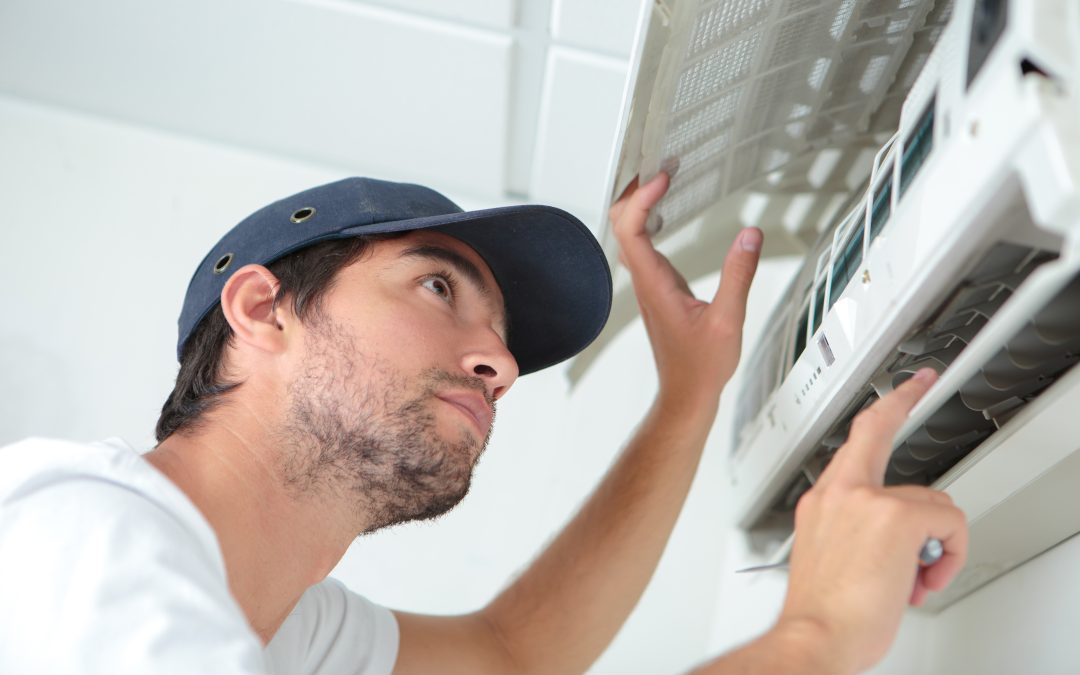Loose or broken parts:
If your air conditioner is making cracking or popping noises, it may be because of a loose part or a malfunctioning one. Constant use, especially during busy times, can eventually wear out the unit. Over time, bolts, screws, or other fasteners may become loose, allowing parts to shake and make unsettling noises. Turning off the air conditioner and visually checking its parts is the first step in fixing the problem. Check for damage and tighten any screws or bolts that are loose. Seek professional help if you have any doubts or are unable to determine what the issue is.
Expansion and contraction of materials:
During their normal operation, air conditioners experience temperature fluctuations. The ducting, coils, and other metallic pieces heat up and cool down as the system cycles on and off. This constant expansion and contraction of materials can lead to the development of popping sounds.
While some squeaking is to be expected as a result of temperature changes, unusually loud or sudden noises could signify trouble. You may reduce the amount of time the air conditioner cycles on and off by making sure it is appropriately sized for the room, and you can reduce the noise created by temperature swings by installing insulation in the ducting.
Ice build-up on condenser coils:
Air conditioners can also make cracking noises if ice forms on the evaporator coils. When this happens, the coils have likely experienced a refrigerant imbalance or inadequate airflow, both of which lead to freezing. There will be cracking and popping sounds as the ice expands and contracts. To begin fixing this problem, you should switch off the air conditioner and let the ice melt. After the coils have melted, you should check them for obstructions or other damage. Maintain adequate airflow by periodically cleaning or replacing air filters, and if the issue persists, call in a pro to check the level of refrigerant and the efficiency of the entire system.
Limitations on airflow:
If the air conditioner’s vents are blocked, the internal pressure may rise, requiring the various parts to work harder and possibly resulting in cracking or popping noises. Clogged or dirty air filters, closed vents, and physical obstacles near the air inlet or outlet are common reasons for decreased airflow. Maintaining healthy airflow requires checking and replacing air filters on a regular basis. Make sure there is nothing blocking vents and remove any clutter from the area. The efficiency of the air conditioner as a whole is improved and noise levels are lowered when there is sufficient airflow.
Faulty thermostats:
Thermostat problems can cause the air conditioner to cycle on and off at odd times, which can be heard as a variety of noises. If the thermostat is broken or not properly adjusted, the system may cycle on and off too often, resulting in annoying noises. If you think the thermostat is to blame for the cycle problems, get it calibrated or replaced. A properly operating thermostat keeps the air conditioner running smoothly, cuts down on wear and tear, and lessens the possibility of strange noises.
Production flaws:
There could be a manufacturing error or a design flaw in the air conditioner itself if you hear cracking or popping sounds. Coil, fan, and other component faults are uncommon but can cause strange noises during operation. You should get in touch with the maker for support if your air conditioner is still covered by a warranty. They may provide alternatives to fixing or replacing broken parts. If the warranty has expired, it is still possible to have any underlying problems with the product’s design or construction diagnosed and fixed by talking with a competent technician.
Water drainage issues:
When condensation builds up because of poor drainage, the air conditioner may make cracking or popping noises. This occurs frequently in damp environments or when the condensate drain pipe is clogged. Ensure that the condensate drain line is clear and free from clogs. Pooling water around the unit could be a sign of a drainage problem. Proper drainage not only minimizes noise but also assists in preserving the reliability of the air conditioning system.
Badly insulated:
When there isn’t enough insulation surrounding the air conditioner or within the walls, noise from outside can seep in and give the impression that the machine is making cracking or popping noises. To lessen the impact of outside noise, you may wish to consider installing or upgrading insulation around the unit and within the walls. Another way to improve the acoustic environment inside and make your home more peaceful is to seal any cracks or openings in the windows and doors.
Inadequately sized ductwork:
Problems with airflow and noise might result from ductwork that is either too tiny or too large for the air conditioner. For the HVAC system as a whole to run smoothly and quietly, the ductwork must be properly scaled and built. If you’ve recently made adjustments to your system or are experiencing noise problems, speak with an HVAC specialist to review the sizing and setup of your ductwork. It may be essential to make some alterations to improve ventilation and lessen background noise.
Rust or corrosion:
Particularly with older air conditioning units, corrosion or rust on particular components might contribute to strange noises. Metal pieces that have corroded may make cracking or popping noises when they move during the functioning of the system. It is essential to check for rust and corrosion on a regular basis. If you find any, you may want to clean and treat the area right away. Anti-corrosion coatings, applied as part of regular maintenance, can also help halt the deterioration and subsequent sounds.

